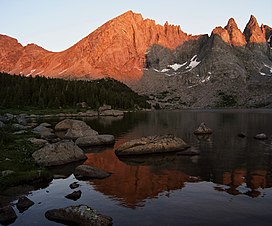Bollinger Peak is a 12,232-foot-elevation (3,728-meter) mountain summit located on the shared border of Sublette County and Fremont County in the state of Wyoming, United States.[4]
| Bollinger Peak | |
|---|---|
 West aspect, from Shadow Lake at sunset | |
| Highest point | |
| Elevation | 12,232 ft (3,728 m)[1][2] |
| Prominence | 472 ft (144 m)[1] |
| Parent peak | Pylon Peak (12,383 ft)[3] |
| Isolation | 1.01 mi (1.63 km)[3] |
| Coordinates | 42°46′58″N 109°13′58″W / 42.78278°N 109.23278°W[1] |
| Geography | |
| Location | Sublette County / Fremont County Wyoming, U.S. |
| Parent range | Wind River Range Rocky Mountains |
| Topo map | USGS Lizard Head Peak |
| Geology | |
| Rock type | granitic |
| Climbing | |
| Easiest route | class 3[3] Northeast ridge |
Description
editThe peak is situated in the remote Wind River Range, on the Continental Divide, in the renowned Cirque of the Towers. It is set on the common boundary Popo Agie Wilderness shares with the Bridger Wilderness, on land managed by Bridger-Teton National Forest and Shoshone National Forest. Bollinger ranks as the 148th-highest peak in Wyoming, and topographic relief is significant as the west aspect rises 2,000 feet (610 meters) above Shadow Lake in one-half mile.[3] Nearby geographic features include Wolfs Head, 0.16 mile to the south, Sharks Nose one-half mile south, and Pingora Peak 0.44 miles to the southeast. The peak's unofficial name commemorates Karl Bollinger who perished August 11, 1953, from a leader fall on nearby War Bonnet Peak, the day after he climbed this namesake peak.[5] His name has also been reported as Karl Bollinger Jr.,[6] and Kent Bollinger.[7]
Climbing
editThe northeast ridge was first climbed in 1941 by Norman Clyde, Edith and J. Holliday, and B. Pitcher. Other established routes include the West Face by Steven French and Matt Parramore in 1981, and the West Pillar (IV 5.10).[8]
Climate
editAccording to the Köppen climate classification system, Bollinger Peak is located in an alpine subarctic climate zone with long, cold, snowy winters, and cool to warm summers.[9] Due to its altitude, it receives precipitation all year, as snow in winter, and as thunderstorms in summer. Precipitation runoff from the mountain's west side drains to the Green River via Washakie Creek, and the east side drains into Lonesome Lake, thence North Fork Popo Agie River.
Hazards
editEncountering bears is a concern in the Wind River Range.[10] There are other concerns as well, including bugs, wildfires, adverse snow conditions and nighttime cold temperatures.[11]
Importantly, there have been notable incidents, including accidental deaths, due to falls from steep cliffs (a misstep could be fatal in this class 4/5 terrain) and due to falling rocks, over the years, including 1993,[12] 2007 (involving an experienced NOLS leader),[13] 2015,[14] and 2018.[15] A 54-year-old climber fell 400–800 feet to his death from Steeple Peak in 2017.[16] Other incidents include a seriously injured backpacker being airlifted near Squaretop Mountain[17] in 2005,[18] and a fatal hiker incident (from an apparent accidental fall) in 2006 that involved state search and rescue.[19] The U.S. Forest Service does not offer updated aggregated records on the official number of fatalities in the Wind River Range.
See also
editReferences
edit- ^ a b c "Bollinger Peak, Wyoming". Peakbagger.com. Retrieved 2021-07-31.
- ^ Orrin H. Bonney, Lorraine G. Bonney, 1965, Guide to the Wyoming Mountains and Wilderness Areas, Sage Books, page 181.
- ^ a b c d "Bollinger Peak - 12,232' WY". listsofjohn.com. Retrieved 2021-07-31.
- ^ Joe Kelsey, 2013, Climbing and Hiking in the Wind River Mountains, Falcon Guides, ISBN 9781493001354, page 30.
- ^ C. L. Rawlins, Sky's Witness: A Year In The Wind River Range, 2014, Henry Holt and Company, ISBN 9781466882416
- ^ Chicago Tribune, August 14, 1953
- ^ Accidents in American Mountaineering: Annual Report of the Safety Committee of the American Alpine Club, 1954, page 7.
- ^ Joe Kelsey, 2013, Climbing and Hiking in the Wind River Mountains, Falcon Guides, ISBN 9781493001354, page 428.
- ^ Peel, M. C.; Finlayson, B. L.; McMahon, T. A. (2007). "Updated world map of the Köppen−Geiger climate classification". Hydrol. Earth Syst. Sci. 11. ISSN 1027-5606.
- ^ Staff (April 24, 2017). "Bear Safety in Wyoming's Wind River Country". WindRiver.org. Retrieved February 17, 2019.
- ^ Ballou, Dawn (July 27, 2005). "Wind River Range condition update - Fires, trails, bears, Continental Divide". PineDaleOnline News. Retrieved February 17, 2019.
- ^ Staff (1993). "Falling Rock, Loose Rock, Failure to Test Holds, Wyoming, Wind River Range, Seneca Lake". American Alpine Club. Retrieved February 15, 2019.
- ^ MacDonald, Dougald (August 14, 2007). "Trundled Rock Kills NOLS Leader". Climbing. Retrieved February 15, 2019.
- ^ Staff (December 9, 2015). "Officials rule Wind River Range climbing deaths accidental". Casper Star-Tribune. Retrieved February 15, 2019.
- ^ Dayton, Kelsey (August 24, 2018). "Deadly underestimation". WyoFile News. Retrieved February 15, 2019.
- ^ Nick Learned, Climber Falls to His Death in Wyoming's Wind River Range, August 31, 2017, k2radio.com
- ^ Funk, Jason (2009). "Squaretop Mountain Rock Climbing". Mountain Project. Retrieved March 29, 2019.
- ^ Staff (July 22, 2005). "Injured man rescued from Square Top Mtn - Tip-Top Search & Rescue helps 2 injured on the mountain". PineDaleOnline News. Retrieved February 17, 2019.
- ^ Staff (September 1, 2006). "Incident Reports - September, 2006 - Wind River Search". WildernessDoc.com. Archived from the original on January 27, 2020. Retrieved February 17, 2019.
External links
edit- Bollinger Peak rock climbing: Mountainproject.com
- Bollinger's fatality report: AAC-publications

